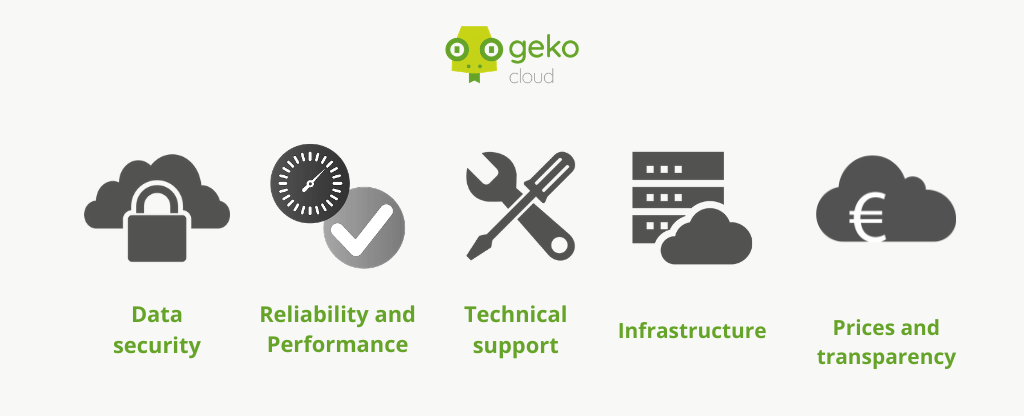In today’s fast-changing environment, many businesses are starting to think about how cloud solutions can help them improve their productivity, but before making the decision of going to the cloud, companies must choose which provider they want to provide these cloud services to them.
If you are considering moving your platform to the cloud, especially in these times where we work more time from home, be sure to read this post and discover the keys to choosing the best cloud solution provider for your business.👇
Data security
When selecting a cloud provider, it is important to know that it complies with all the regulatory security criteria based on the protection and sovereignty of data as dictated by the RGPD (General Data Protection Regulation), in addition, such data must be encrypted both in transit and in storage. Another point to keep in mind is the security certifications held by the cloud solution provider, such as ISO 27001 or ISO 9001.
There are a number of services that already provide these end-to-end encryption elements implemented as standard, and you will need to know their specifications to implement them correctly, such as bulk data volumes, databases, communications and many others.
In addition, if you are involved in transactions that involve management of payments and confidential data, you are likely to need a PCI-certified provider.
Reliability and Performance
When choosing a cloud service provider, you should first ensure that they have a contingency plan to guarantee uninterrupted service in case of a service breakdown. Knowing this information is of vital importance, as it can lead to loss of customers and loss of revenues.
At this point, the great majority of public cloud providers have several availability zones. We recommend consulting the network topology to find out both the availability zones and the regions of your cloud provider, not only to show their magnitude but also to find out the availability to grow in infrastructure at a global level in order to be close to your end user.
There are several methods to find out how the supplier copes during the downtimes. One of them is to know their SLA for the last 6 to 12 months. The SLA (Service Level Agreement) is an agreement that specifies the services that the cloud provider must offer, such as their response times in case they have to block an attack. This information is usually published, but if this is not the case, they must provide it on request.
Technical support
Cloud environments are quite complex, so it is important to have a qualified technical staff that can adapt to specific needs, address security issues or support you in the process of deployment and migration to the cloud.
This point is vital for the peace of mind of your business. Keep in mind that in the situation of a disaster or service discontinuity, working with a cloud provider offers many tools but also makes physical access to its platform impossible, so there will be a moment when you will be at the mercy of its support team, its reliability, transparency and level of maturity.
Infrastructure
The cloud infrastructure is composed of a set of elements: storage, network, hardware, and so on. From this point, we can differentiate between public cloud, private cloud or the combination of both, the hybrid cloud. The current trend is to migrate to hybrid cloud infrastructures, as they include the most important aspects of the previous solutions. One of the characteristics of the hybrid cloud is the storage of data, which is divided between local infrastructure and cloud infrastructure.
As we mentioned previously, it is very important to know the size and volume of the services to get an idea of the maturity, reliability and growth possibilities that a cloud service provider can offer us. In terms of services, it is very important to know which services are we hosting in the cloud in order to know which services we’ll need to exploit in each case, and see if we are choosing the best provider in each case: Deploying a website in a CMS is not the same as deploying a machine learning platform or a marketplace…
Pricing and transparency
One of the most important points is obviously the monthly cost of using the selected cloud services. The calculators offered by cloud providers, as our clients explain to us, are not as simple and transparent as they could be. Let’s remember that the cloud allows us to grow and eliminate obvious operating costs quickly and resoundingly in exchange for a passed cost, but what do we have to take into account to calculate the costs in advance and have predictability? It’s a good question, cloud costs are affected by a variety of factors such as: volume of storage space, bandwidth, requests per second, outgoing traffic, communications between VPCs, and so on.
At this point it is necessary to have the advice of specialists who have experience in this area and above all to see if it is a model that fits our pocket and the status of the project.

Finally, in case you are considering different cloud provider options, our cloud and devOps experts can help you choose the option that best suits your business needs. At Geko we work with different cloud providers, IaaS, PaaS and SaaS: Amazon Web Services, Microsoft Azure and Google Cloud Platform. In addition, if you need more information, we have compared some characteristics of two of the three most popular cloud providers in our post “AWS vs AZURE, which one should I choose?“, where you will learn some of the differences.
If you want an expert team to be by your side in the cloud migration process, Geko is the solution. We are a team specialised in cloud development of cloud infrastructures that will advise you on all technologies and will guide you throughout the process from migration to cloud implementation for your company.
